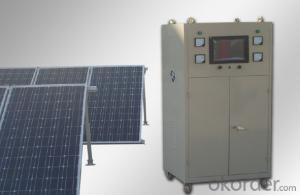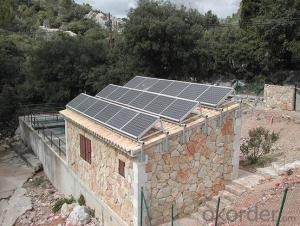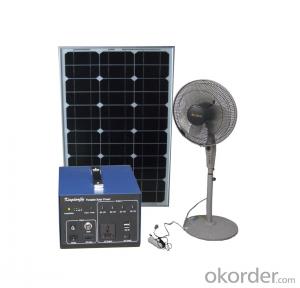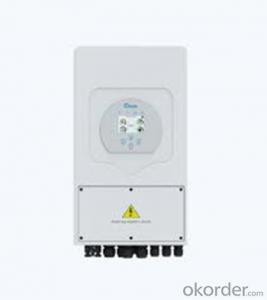Solar Home System CNBM-K8 5KW from CNBM
- Loading Port:
- China main port
- Payment Terms:
- TT OR LC
- Min Order Qty:
- 1 watt
- Supply Capability:
- 100000000 watt/month
OKorder Service Pledge
OKorder Financial Service
You Might Also Like
Item specifice
Description:
CNBM Solar is a world-leading and Vertical integrated manufacturer ofhigh-performance with Silicon,
Wafer, Cells, Modules, which convertsunlight into electricity for residential, commercial, and utility-scale
power generation.
The capacity of CNBMSolar is reach to 1GW, andmake sure each year our shipment capacity is more
Than 700-800MWs, at the same time, wehave set up the largest solar power station with our partner
in Ukraine.
CNBM is a Quality + Service orientedcompany with“Excellence at Each Step” approach, composed of
the finest components from TUV andIEC-certified partners around the world, CNBM modules consistently
undergo a variety of trials at thecompany’s Test & Development Centre, ensuring peak performance
capabilities. The company iscommitted to develop and provide the world with clean and renewable energy
to ease the energy shortages as wellas human kind’s impact on the environment.
Data:
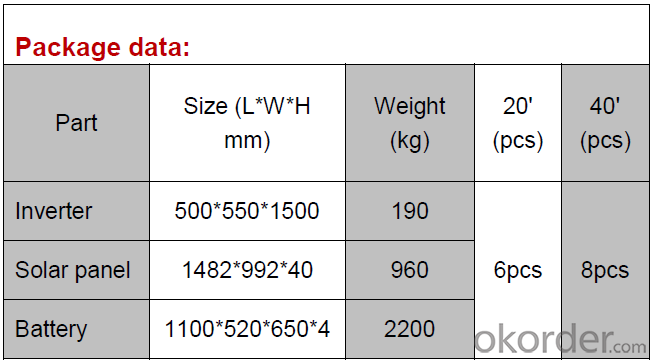
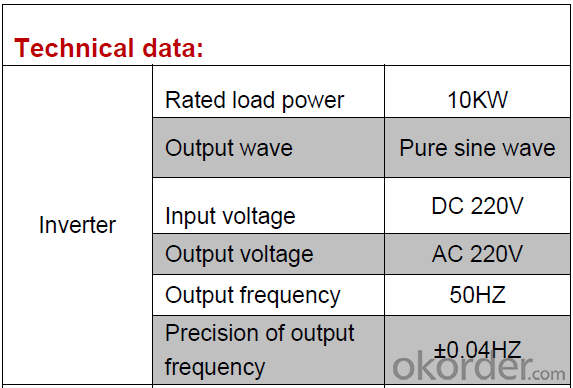
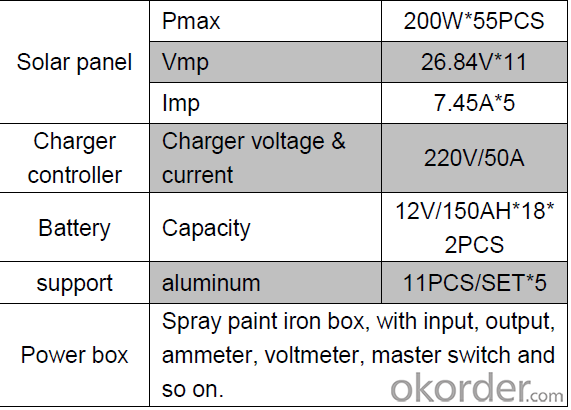
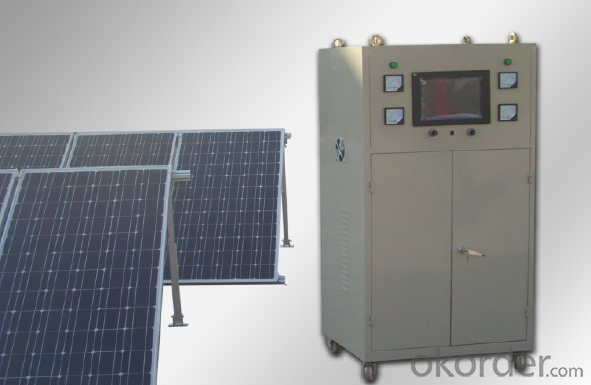
FAQ:How long can we receive the product after purchase?
In the purchase of product within three working days, We will arrange the factory delivery as soon as possible. The pecific time of receiving is related to the state and position of customers.Commonly 7 to 10 working days can be served.
- Q:Can solar energy systems be used in conjunction with other energy sources?
- Yes, solar energy systems can be used in conjunction with other energy sources. This is known as a hybrid energy system, where solar power is integrated with other sources such as wind, hydro, or traditional grid electricity. These hybrid systems help ensure a stable and reliable energy supply, especially during periods of low sunlight or high energy demands. By combining multiple energy sources, the overall efficiency and resilience of the system can be increased, contributing to a more sustainable and diverse energy mix.
- Q:How do solar energy systems impact energy reliability?
- Solar energy systems can have a positive impact on energy reliability by diversifying the energy mix and reducing dependence on traditional fossil fuel-based power sources. By harnessing the abundant and renewable energy from the sun, solar systems can contribute to a more stable and consistent energy supply, especially when combined with energy storage technologies. This not only reduces the risk of power outages and disruptions but also enhances the overall resilience and reliability of the energy grid.
- Q:Solar photovoltaic system
- State subsidies for distributed PV policy: distributed generation price subsidies by 0.42 yuan / kWh (subsidies for a period of 20 years), distributed photovoltaic power generation system of power grid, power grid enterprises in accordance with the local coal-fired power by electricity (0.44 yuan /kWh) acquisition.
- Q:What is the impact of roof angle on the performance of solar panels?
- The impact of roof angle on the performance of solar panels is significant. The angle at which the panels are installed determines their exposure to sunlight and directly affects their energy production. Optimal roof angles vary depending on the geographic location, but generally, a steeper angle allows for better performance in areas with low sunlight, such as higher latitudes, while a shallower angle is more suitable for regions with high solar intensity, like the equator. A proper roof angle maximizes the amount of sunlight absorbed by the panels, leading to greater energy generation and overall efficiency.
- Q:Can solar energy systems be used for powering disaster relief operations?
- Yes, solar energy systems can be used for powering disaster relief operations. Solar power provides a reliable and renewable source of energy, making it ideal for areas impacted by natural disasters where traditional power infrastructure may be damaged or unavailable. Solar energy systems can be quickly deployed, enabling immediate access to electricity for emergency services, communication devices, medical equipment, and temporary shelters. Additionally, solar power systems reduce reliance on fossil fuels, minimizing environmental impact in already vulnerable areas.
- Q:I usually have to use about 10 degrees, more in the summer! Winter sunshine time 10 hours! Who knows how much a set price, what brand?
- General installation 3000W on the line, a full set of system down 21 thousand yuan. Print-Rite used solar panels, inverter with crystal fuyuan. Guilin Jinyang PV is so safe.
- Q:Can solar energy systems be used in powering dental clinics or medical clinics?
- Certainly, dental clinics or medical clinics can indeed utilize solar energy systems to generate power. Solar energy, a clean and sustainable power source, can be harnessed through photovoltaic (PV) panels to produce electricity. These panels convert sunlight into usable energy, which can then be utilized to operate various electrical equipment and appliances in dental or medical clinics. Typically, dental and medical clinics require a substantial amount of electricity for their operations, including lighting, air conditioning, medical equipment, computers, and other electrical devices. By installing solar panels, these clinics can decrease their reliance on the traditional power grid and lower their electricity expenses. Solar energy systems can be tailored to meet the specific energy requirements of dental or medical clinics, ensuring smooth and efficient functioning. The electricity generated by solar panels can be optimized by analyzing the clinic's energy consumption patterns and installing an appropriate number of solar panels to meet the demand. Moreover, besides the cost savings, employing solar energy systems also offers environmental advantages. Solar power is a clean energy source that does not produce any greenhouse gas emissions or air pollutants during operation. By transitioning to solar energy, dental and medical clinics can decrease their carbon footprint and contribute to a healthier environment. Additionally, solar panels have a long lifespan and require minimal maintenance, making them a dependable and resilient energy solution for dental and medical clinics. With proper installation and regular inspections, solar energy systems can provide a consistent and uninterrupted power supply for many years. All in all, solar energy systems present a practical and feasible choice for powering dental or medical clinics. They provide cost savings, environmental benefits, and a reliable electricity source, enabling clinics to operate efficiently while minimizing their impact on the environment.
- Q:What is the role of voltage regulators in a solar energy system?
- The role of voltage regulators in a solar energy system is to ensure that the voltage output of the solar panels is regulated and maintained within a specific range. Solar panels generate direct current (DC) electricity, which needs to be converted to alternating current (AC) for use in homes and businesses. However, the voltage output of solar panels can fluctuate based on factors such as the amount of sunlight, temperature, and system load. Voltage regulators, also known as charge controllers, are responsible for stabilizing the voltage output from the solar panels. They monitor the voltage level and adjust it as needed to prevent overcharging or undercharging of the batteries or the electrical loads connected to the system. By maintaining a consistent voltage, voltage regulators protect the batteries from damage caused by overcharging, which can reduce their lifespan. They also prevent undercharging, ensuring that the batteries are charged to their optimal level, maximizing their efficiency and performance. Additionally, voltage regulators play a crucial role in protecting electrical devices connected to the solar energy system. They prevent voltage spikes or surges that could potentially damage sensitive equipment, such as inverters or appliances. In summary, voltage regulators are essential components in a solar energy system as they regulate and stabilize the voltage output from the solar panels, protecting batteries and electrical devices from potential damage.
- Q:Can a solar energy system be used to power outdoor lighting?
- Yes, a solar energy system can be used to power outdoor lighting. Solar panels collect and convert sunlight into electricity, which can be stored in batteries and used to power outdoor lights during the night. This offers an environmentally-friendly and cost-effective solution for outdoor lighting.
- Q:How do solar energy systems connect to the electrical grid?
- Solar energy systems can connect to the electrical grid by means of net metering, a process that enables the system to generate and consume electricity from the grid. Excess power generated by the solar energy system is sent back to the grid and measured by a bi-directional meter, which calculates the flow of electricity in both directions. This surplus electricity is then credited to the system owner's account, effectively reversing the meter. Conversely, during times when the solar energy system is unable to meet the electricity demand, such as at night or on cloudy days, electricity is drawn from the grid to make up for the shortfall. The bi-directional meter accurately records this flow of electricity and measures the amount consumed from the grid. In summary, the connection between solar energy systems and the electrical grid facilitates the seamless integration of renewable energy into the existing power infrastructure. Net metering ensures that solar system owners can contribute excess electricity to the grid and draw from it when needed, resulting in a more efficient, reliable, and sustainable energy system.
1. Manufacturer Overview |
|
|---|---|
| Location | |
| Year Established | |
| Annual Output Value | |
| Main Markets | |
| Company Certifications | |
2. Manufacturer Certificates |
|
|---|---|
| a) Certification Name | |
| Range | |
| Reference | |
| Validity Period | |
3. Manufacturer Capability |
|
|---|---|
| a)Trade Capacity | |
| Nearest Port | |
| Export Percentage | |
| No.of Employees in Trade Department | |
| Language Spoken: | |
| b)Factory Information | |
| Factory Size: | |
| No. of Production Lines | |
| Contract Manufacturing | |
| Product Price Range | |
Send your message to us
Solar Home System CNBM-K8 5KW from CNBM
- Loading Port:
- China main port
- Payment Terms:
- TT OR LC
- Min Order Qty:
- 1 watt
- Supply Capability:
- 100000000 watt/month
OKorder Service Pledge
OKorder Financial Service
Similar products
New products
Hot products
Hot Searches
Related keywords
